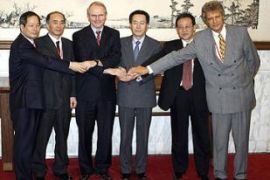But, US officials insisted on Thursday that this was not the case, saying the bilateral talks broke no new ground.
Their talks “certainly don’t represent anything particularly new or different from what we’ve done before,” Tom Casey, the State Department deputy spokesman, said.
|
|
2003
August: First round of six-party talks in Beijing. North Korea issues plan to help reduce tensions, but talks fail to produce an agreement
2004
February: Second round of talks make no significant progress
June: Third round of talks discusses scope, time, and method of verification for disarming North Korea. Again no agreement is made
2005
September: At a fourth round of talks all parties agree plan of action under which North Korea would end its nuclear programme in exchange for aid and security guarantees
North Korea subsequently demands a civilian light-water reactor; a demand rejected by the US and Japan
2006
October 9: North Korea conducts first nuclear weapon test
December: Fifth round of talks end in deadlock. North Korea insists US financial sanctions end as a precondition to disarmament talks
|
His comments were echoed by Tony Snow, the White House spokesman, who told reporters: “We have not had bilateral talks. What you had … this week in Berlin were talks with Chris Hill and a North Korean representative as preparations for the six-party talks.”
He added: “This is not an instance of bilateral negotiations on the side.”
On Wednesday, in the midst of talks with North Korea, Hill suggested that the real brokering should take place in the six-party format, which involves the two Koreas, the US, Japan, China, and Russia.
“It’s very important that any negotiating or deal-making needs to be done in the six-party process,” he said.
Those broader talks are aimed at convincing North Korea to abandon its nuclear weapons programme in exchange for security guarantees and normalised relations with Washington, as well as economic aid.
Several rounds of six-party talks have failed to produce significant results.
The last round in Beijing in December broke down with North Korea insisting that financial sanctions be lifted before negotiations on disarmament could proceed.
‘Coercion’
The lack of progress has caused patience to wear thin among some quarters in Washington.
William Perry, the former US defence secretary under President Bill Clinton, said on Thursday that the US should consider military action if South Korea and China do not take a tougher line against North Korea’s nuclear ambitions.
Speaking to a congressional hearing on Thursday Perry said possible action could include a strike against a large reactor under construction in North Korea capable of producing material for up to 10 nuclear bombs a year.
“If China and South Korea do not agree to applying coercion, the United States might be forced to military action which, while it certainly would be successful, could lead to dangerous unintended consequences.”
